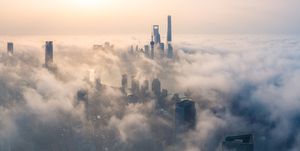The Truth About Air Filters and COVID Prevention
Long before COVID-19 had us all spending a lot more time inside our home and worrying about airborne everything, the quality of the air indoors was making people sick. Air pollution can come from pretty much anything—candles, grooming products, burning firewood, printers, and even your cooking. These pollutants intermingle with those that enter through drafty doors or windows—including particles from tires on the road, factory smokestacks, and plowed fields. All told, levels of air pollutants indoors may be two to five times as high as in the air outside, and they contribute to health problems ranging from burning eyes to lung disease.

All this breathable filth is made up of gases and particles of various sizes. Although the U.S. government tracks larger inhalable particles such as diesel exhaust and power-plant emissions, it has no data on dangerous ultra-fine particles so small they can cross into the bloodstream, says John Balmes, M.D., a professor of environmental health sciences at UC Berkeley’s School of Public Health. And if there’s insufficient data, that makes it challenging for researchers to gauge health effects in humans.
Animal studies are, unfortunately, the best thing science has—and the findings aren’t exactly great news. Researchers have noticed that when animals are exposed to pollution, they can develop lung inflammation that can “spill into the circulation,” says Dr. Balmes, which can trigger systemic inflammation.
That inflammation may contribute to diabetes, obesity, atherosclerosis, and neurodegeneration (resulting in diseases including Alzheimer’s and Parkinson’s). In the shorter term, bad air can give you a headache or sore throat and cause dizziness and fatigue. Poorly ventilated rooms can also muck up your ability to think straight, and they may leave you bathing in (and, more important, breathing in) particles that contain airborne viruses.
But air filters may help. “The quality of your indoor environment impacts your health and performance. The science is clear on that,” says Joseph Allen, D.Sc., M.P.H., an associate professor and the director of the Healthy Buildings program at Harvard University’s T. H. Chan School of Public Health. Whether you should rush out and buy one (or more) is more nuanced.
Does everyone need an air filter right now?
Maybe. “Everyone who lives in an area affected by wildfire smoke should prepare to filter the air in your home,” says Brett Singer, Ph.D., a staff scientist and principal investigator in the energy technologies area of the Lawrence Berkeley National Laboratory. “Many people who live in places that have had clean air in the past are now experiencing some of the worst air quality in the country,” he says. (If your weather report doesn’t include air quality, check airnow.gov and look for a “good” rating.) Throwing windows open if your outdoor air is okay—even just cracking them—can bump up your home’s air-exchange rate, the rate at which air inside turns over with fresh air from outside. It could also help protect the people in your home if you or someone you live with has been infected by the coronavirus, says Richard Corsi, Ph.D., dean of the Maseeh College of Engineering and Computer Science at Portland State University. Isolate the sick person in a bedroom with a box fan set up to suck air out the window.
But what if you can’t open your windows?
Then it’s time for an air filter. “HEPA air filters collect 99.97 percent of particles at 0.3 microns, but they’re even better for larger and smaller particles,” says Corsi. This is due to the way particles of other sizes (including particles that carry the coronavirus) move through the air and crash into the filter. “For smaller apartments, classrooms, or shops that do not already have high ventilation rates, you could see a 90 percent reduction of particles of the size that convey the coronavirus in indoor air,” he says. “That’s an order-of-magnitude decrease in the risk of exposure to this virus. That’s pretty darn good.”
How do you pick an air filter?
How to use an air filter right
You’ve bought a purifier. Great. Now put it somewhere in your home where you spend a lot of time, like your bedroom, and set it slightly off the floor, away from walls. Sometimes a purifier’s air intake or exhaust can resuspend particles that are on the floor into the air, explains Portland State University’s Richard Corsi, Ph.D. Placing it on a low table can help you steer clear of that. Also make sure it’s at least three feet away from walls and corners, he adds, to avoid recirculating the air in one area.
Source: Read Full Article





